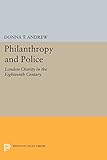Philanthropy and Police : London Charity in the Eighteenth Century / Donna T. Andrew.
Material type: TextSeries: Princeton Legacy Library ; 1037Publisher: Princeton, NJ : Princeton University Press, [2014]Copyright date: ©1989Edition: Course BookDescription: 1 online resource (240 p.)Content type:
TextSeries: Princeton Legacy Library ; 1037Publisher: Princeton, NJ : Princeton University Press, [2014]Copyright date: ©1989Edition: Course BookDescription: 1 online resource (240 p.)Content type: - 9780691600116
- 9781400860630
- 361.7/09421
- HV250.L66 -- A53 1989eb
- online - DeGruyter
- Issued also in print.
| Item type | Current library | Call number | URL | Status | Notes | Barcode | |
|---|---|---|---|---|---|---|---|
 eBook
eBook
|
Biblioteca "Angelicum" Pont. Univ. S.Tommaso d'Aquino Nuvola online | online - DeGruyter (Browse shelf(Opens below)) | Online access | Not for loan (Accesso limitato) | Accesso per gli utenti autorizzati / Access for authorized users | (dgr)9781400860630 |
Browsing Biblioteca "Angelicum" Pont. Univ. S.Tommaso d'Aquino shelves, Shelving location: Nuvola online Close shelf browser (Hides shelf browser)

|

|

|

|

|

|

|
||
| online - DeGruyter Beauty and Holiness : The Dialogue Between Aesthetics and Religion / | online - DeGruyter Emerson : The Roots of Prophecy / | online - DeGruyter Poems / | online - DeGruyter Philanthropy and Police : London Charity in the Eighteenth Century / | online - DeGruyter The Discipline of Subjectivity : An Essay on Montaigne / | online - DeGruyter The Suasive Art of David Hume / | online - DeGruyter Screen/Play : Derrida and Film Theory / |
Frontmatter -- Contents -- Preface -- Introduction -- CHAPTER ONE. "All Mankind's Concern": Religion, Commerce, and Charity, 1680-1740 -- CHAPTER TWO. "Private Virtue and Publick Spirit Display'd": The Search for Charitable Forms -- CHAPTER THREE. Charity and the Charitable Community at Midcentury -- CHAPTER FOUR. Charitable Foundations, 1750-1770 -- CHAPTER FIVE. Poverty and the Attack on Dependency -- CHAPTER SIX. The Charities of Self-Help -- CONCLUSION. Tradition, Policy, and Philanthropy -- APPENDIX. Major Donors -- Index
restricted access online access with authorization star
http://purl.org/coar/access_right/c_16ec
In this study of voluntary charities in eighteenth-century London, Donna Andrew reconsiders the adequacy of humanitarianism as an explanation for the wave of charitable theorizing and experimentation that characterized this period. Focusing on London, the most visible area of both destitution and social experimentation, this book examines the political as well as benevolent motives behind the great expansion of public institutions--nondenominational organizations seeking not only to relieve hardship, but to benefit the nation directly--funded and run by voluntary associations of citizens. The needs of police, the maintaining of civil order and the refining of society, were thought by many ordinary citizens to be central to the expansion of England's role in the world and to the upholding of the country's peace at home.Drawing on previously unexplored and unsynthesized materials, this work reveals the interaction between charitable theorizing and practical efforts to improve the condition of the poor. The author argues that it is impossible to comprehend eighteenth-century charity without taking into account its perceived social utility, which altered as circumstances mandated. For example, the charities of the 1740s and 1750s, founded to aid in the strengthening of England's international supremacy, lost their public support as current opinions of England's most urgent needs changed. Creating and responding to new visions of what well-directed charities might accomplish, late-century philanthropists tried using charitable institutions to reknit what they believed was a badly damaged social fabric.Originally published in 1989.The Princeton Legacy Library uses the latest print-on-demand technology to again make available previously out-of-print books from the distinguished backlist of Princeton University Press. These editions preserve the original texts of these important books while presenting them in durable paperback and hardcover editions. The goal of the Princeton Legacy Library is to vastly increase access to the rich scholarly heritage found in the thousands of books published by Princeton University Press since its founding in 1905.
Issued also in print.
Mode of access: Internet via World Wide Web.
In English.
Description based on online resource; title from PDF title page (publisher's Web site, viewed 30. Aug 2021)


